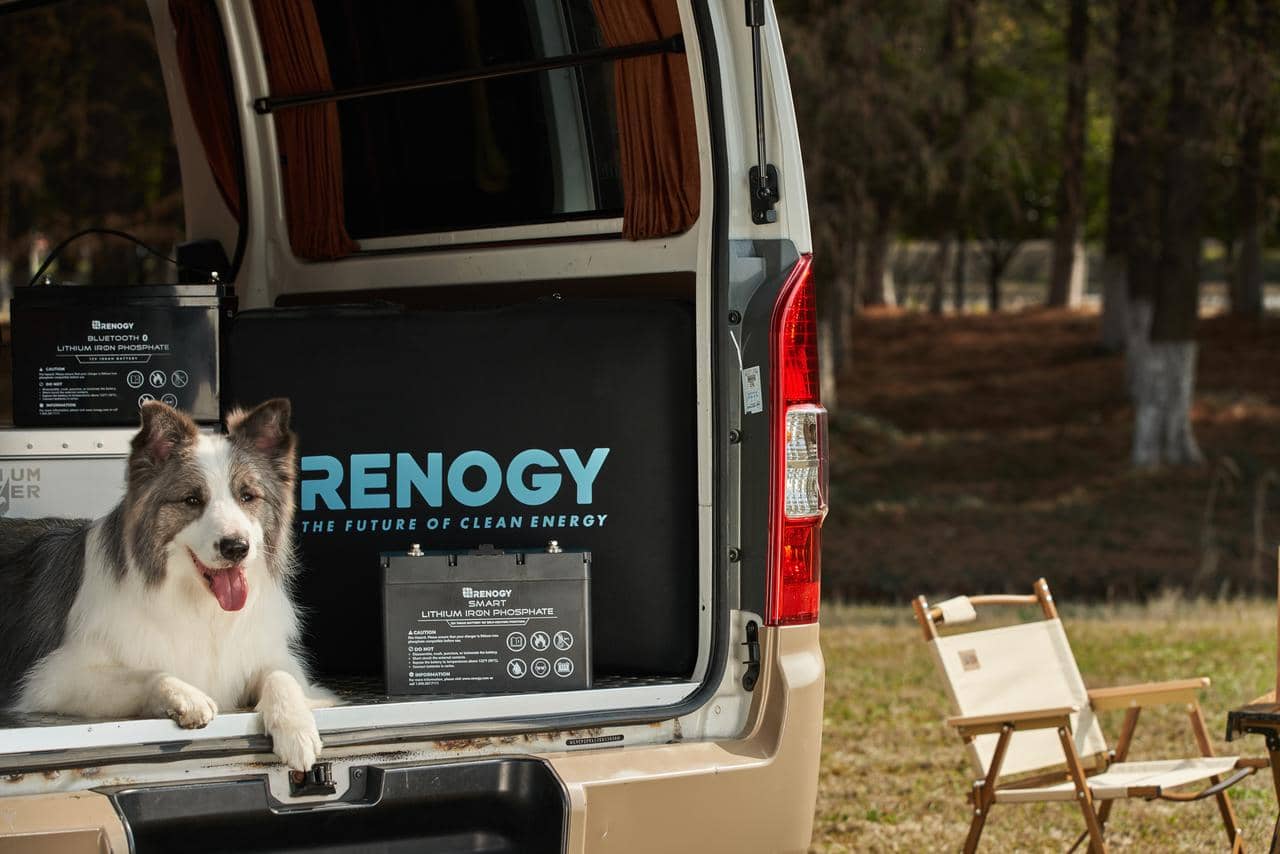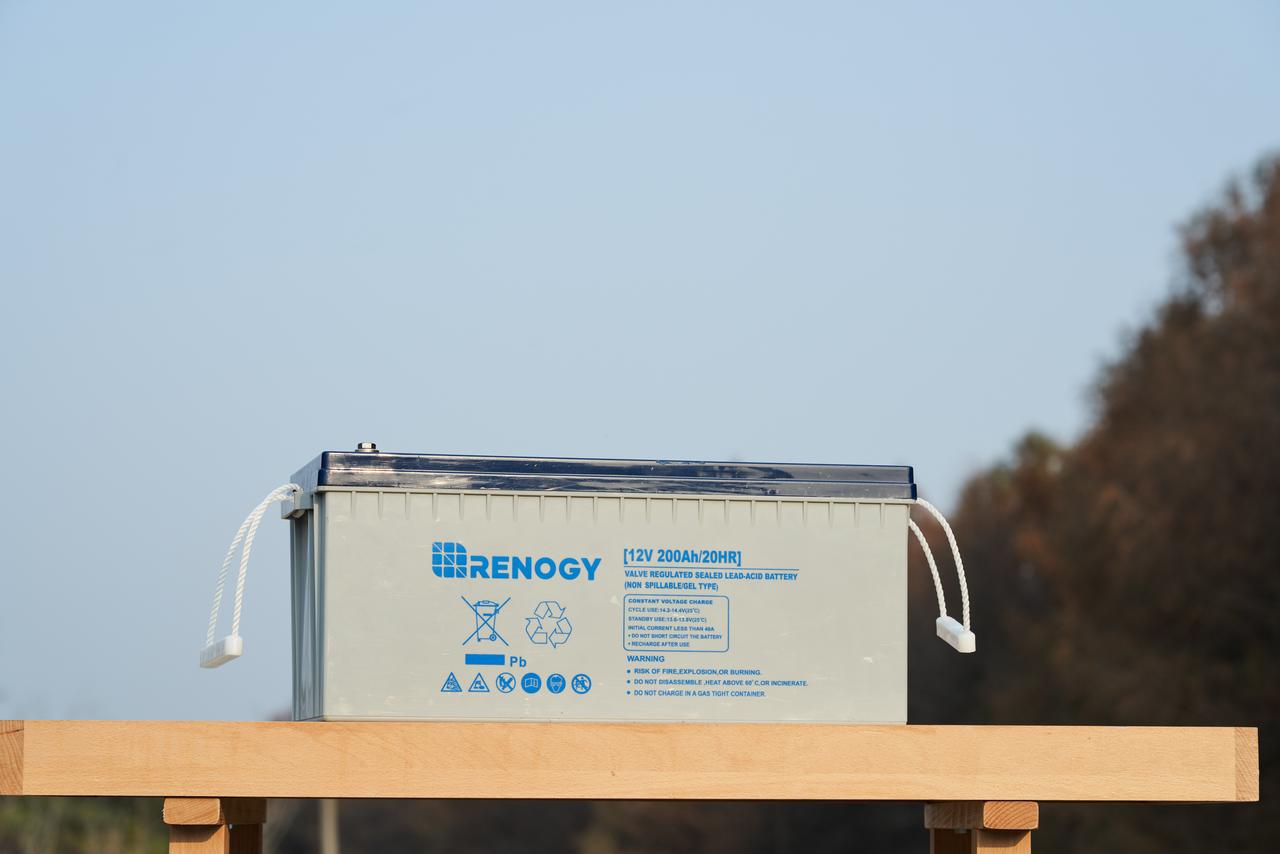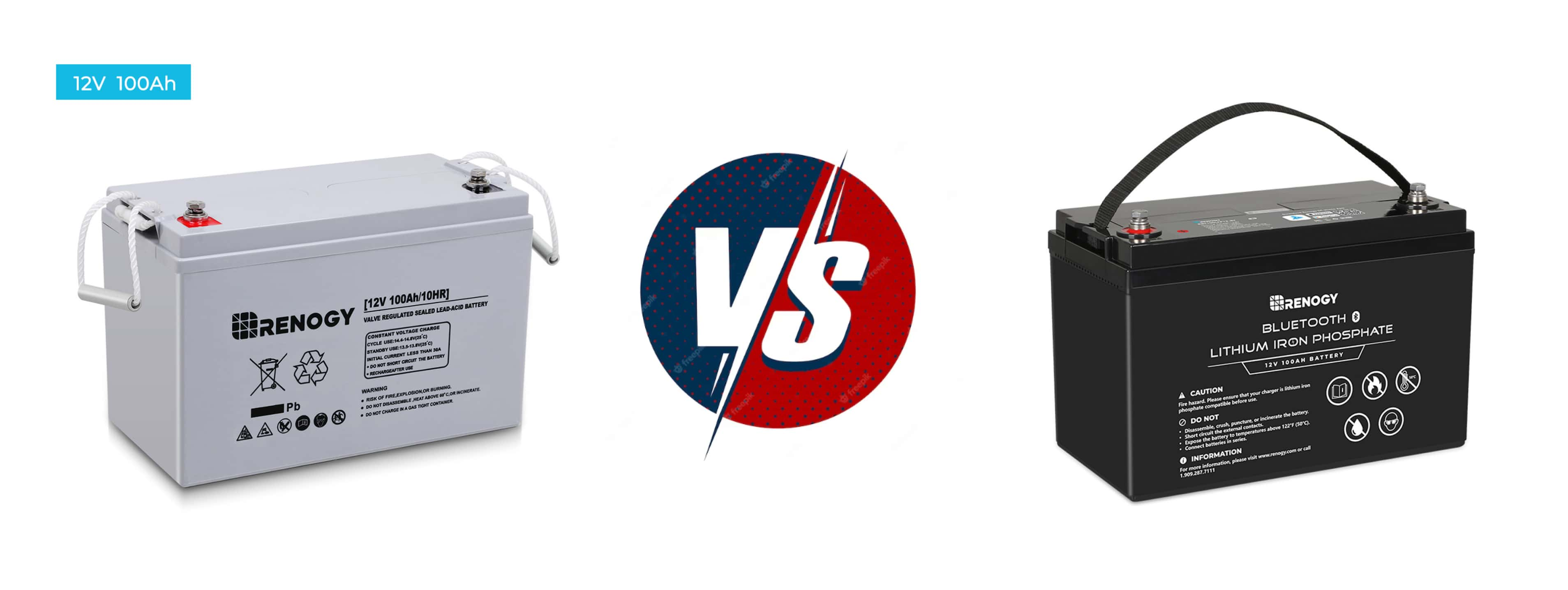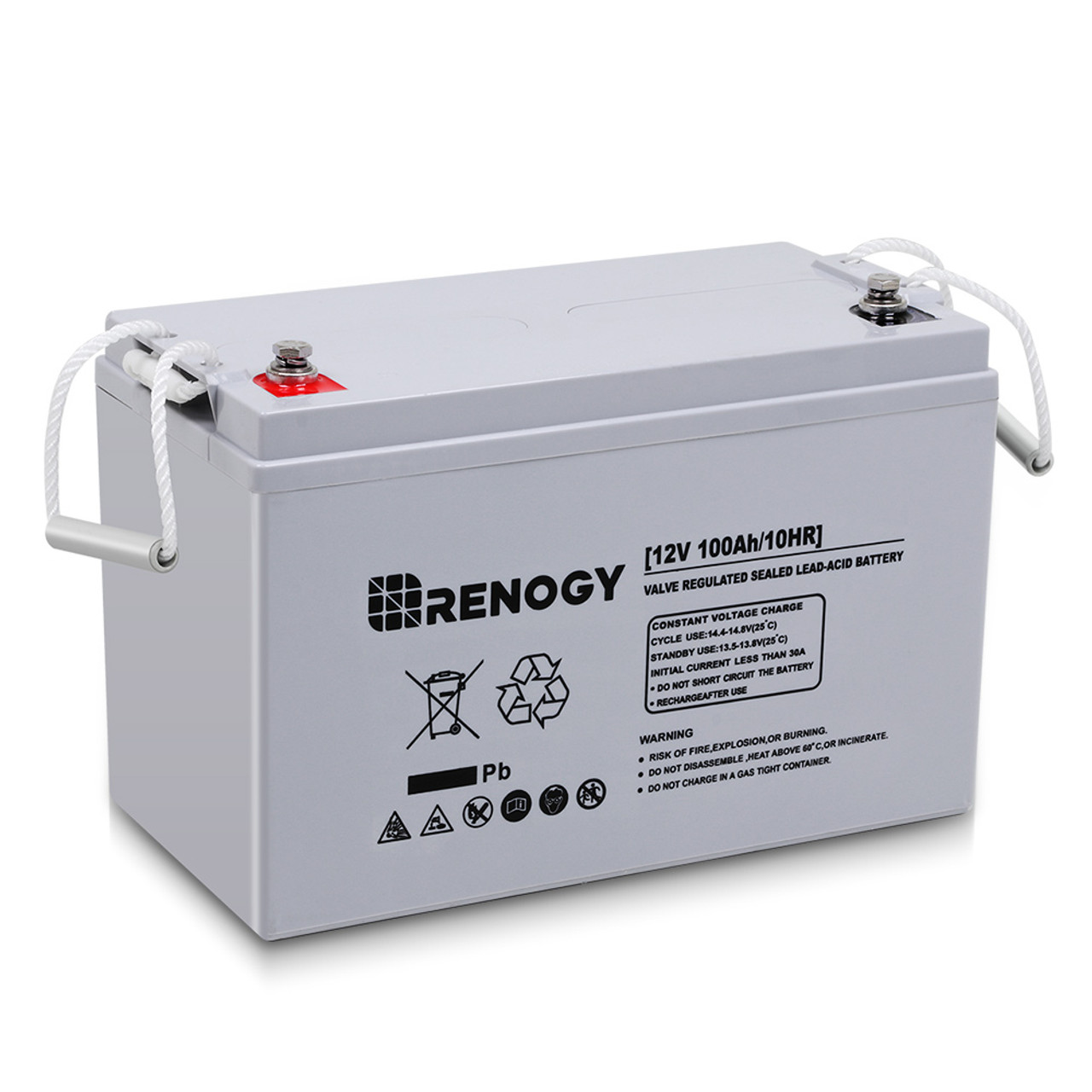Embarking on an off-grid adventure with your recreational vehicle (RV) can be a memorable experience. With your RV, you can enjoy being away from your regular home activities while immersing yourself in nature.
However, to have the best experience, you need an off-grid solar battery to power your appliances when your solar system is not generating electricity, such as at night. But the challenge is choosing the best battery for your system when off-grid.
This piece discusses all you need to know about the various types of RV batteries to consider for your off-grid solar system. You will also learn why Renogy’s RV batteries are the best for dry camping.
What Can An RV Battery Be Used For?
RV batteries are used in a few applications, but the primary purpose is to conserve electricity for future use. The batteries serve as power storage, which comes in handy at night, during cloudy days, or in locations without electrical outlets.
RV batteries are a reliable source of power to power your RV’s appliances like TVs, ventilation systems, microwaves, and water pumps.
What RV Batteries Are Typically Used In a Caravan?
Typically, RV batteries can be classified as lithium-ion batteries and lead-acid batteries, with flooded, AGM, and GEL batteries grouped under lead-acid batteries. All these classifications of batteries can be used in a caravan, each with its benefits and shortcomings.
Here is a quick rundown of the benefits and shortcomings of RV batteries:
Lithium-ion Batteries
Lithium-ion batteries are one of the best RV batteries currently in use. It comprises a graphite anode and a metal oxide cathode plate, with an electrolyte formed from a mixture of lithium salts and a solvent.
They are available in various options, such as Lithium Iron Phosphate (LFP), Lithium Cobalt Oxide (LCO), and Lithium Nickel Manganese Cobalt Oxide (NMC).

Lithium-ion batteries have a high Depth of Discharge (DOD) value of about 90-95% of electricity, compared to AGM batteries with about 50% DOD.
A battery’s DOD value is the total amount of energy the battery can discharge without causing damage; hence, the higher the DOD, the higher the battery’s runtime. This makes lithium-ion batteries a perfect choice for RV owners who are primarily off-grid.
Flooded Battery
Flooded batteries are sometimes called “wet batteries.” They are conventional batteries assembled with liquid electrolytes and lead plates. When in use, the acid ions in the electrolyte migrate to the lead plates, generating the required electric current.
AGM Battery or Gel Battery
Absorbed Glass Mat (AGM) and Gel batteries are classified as Sealed Lead Acid. AGM batteries are an advanced form of lead-acid batteries; they are built with two battery plates separated by a special glass mat, acting as a conductor for the electrolyte solution in the battery.
The glass mat material ensures the electrolyte is in a dry state rather than a liquid. When active, the saturated electrolyte is conducted from the glass mat to the battery plates.
In contrast, the gel battery uses silica gel as a conductor to move electrons between the battery plates.
Also, gel batteries lose electricity faster at lower temperatures, which doesn’t affect the functionality of AGM batteries. Hence, it is safe to conclude that AGM batteries are a better choice for locations with lower temperatures.

The glass mat material ensures the electrolyte is in a dry state rather than a liquid state. When active, the saturated electrolyte is conducted from the glass mat to the battery plates.
In contrast to the AGM battery, the gel battery uses silica gel as a conductor to move electrons between the battery plates. The gel battery also loses electricity faster at lower temperatures, while the AGM can function more properly at lower temperatures, making it a good choice for locations with lower temperatures.
*AGM has about 200-750 cycles at 100% Depth of Discharge, while lithium batteries have about 300-4000. This means if an AGM battery is used at the same time and day as a lithium battery, the AGM will be replaced six times before the lithium battery.
Types of RV Deep Cycle Batteries
Deep cycle batteries, also known as house batteries, are handy in powering appliances, equipment, RV, or boats. They differ from regular batteries in that they are built to deliver a steady amount of current and are adapted to high cycles of discharge, which can be damaging to regular batteries.
RV deep-cycle batteries can be classified into two: lithium deep-cycle RV batteries and lead-acid deep-cycle RV batteries.
AGM Battery vs. Lithium Battery: Which Is Better?
Comparing AGM batteries to lithium batteries, choosing which is better depends on what you most cherish in your battery. Here are what each battery option offers:

AGM Battery Advantages:
- AGM batteries are sealed and spill-free, a significant upgrade over the flooded lead acid. This feature makes the battery safe for RV owners, as electrolyte spilling can be hazardous to the RV components.
- AGM batteries attain the balance between price and benefits. They offer the right benefit at an even price, making it a luxury for less.
- AGM batteries are considered toxic-free and environmentally friendly compared to flooded lead batteries.
Lithium Battery Advantages
- They take approximately 7 hours to charge, making them easier to use.
- A lithium battery can be depleted to about 99% and then recharged, which means they do not need to be charged as often as an AGM battery.
- They are equipped with a Battery Management System (BMS). BMS protects the lithium battery from extreme temperatures, preventing it from accepting any charge at low temperatures.
- Lithium-ion batteries can operate at low temperatures, as low as -4F to +140F, making them the perfect choice for extreme temperatures.
- Lithium batteries’ State of Charge reduces to about 80% after eight months, making them perfect for occasional RV users. For example, if you don’t use your RV frequently, lithium batteries are the right RV battery to opt for, as they remain undamaged when left idle for extended periods.
- They have a Depth of Discharge of about 90-95%, which means an increased total runtime compared to AGM.
What Factors Are Considered When Shopping For an RV Battery?
Durability
The durability of a product influences the lifespan and performance of the product. Lithium batteries can last up to 10 years and withstand about 300-4000 cycles of charge and discharge before a reduction in performance. In contrast, lead acid batteries can last about 2-3 years and withstand around 200-750 cycles of charge and discharge before a reduction in performance.
Power Output
Calculate your daily energy consumption to determine the battery capacity best suited for you. List the power-consuming appliances in your RV and their power capacity to get your total daily energy consumption.
Multiply each power capacity with the estimated hours of usage to get your daily energy consumption (do this for each appliance). Add 10-20% extra for inefficiencies and losses during charging or discharging cycles.
Finally, divide the total daily energy consumption previously calculated by the battery’s voltage to get the capacity needed. This ensures you get the right battery capacity for your RV. High-capacity RV batteries are highly needed if you frequently travel to deserted areas.
For details on how to calculate how much power your solar system generates, see Renogy Solar Sizing Calculator.
Rechargeability
This includes how well the battery holds a charge and how long it takes to recharge. Typically, lithium batteries hold a charge longer than lead-acid batteries and take less time to recharge than lead-acid batteries. These two factors directly impact how well you get to fully optimize your battery.
Cost and Warranty Time
Lastly, when shopping for an RV battery, determine your budget and get an RV battery best suited for this price range. Lithium-ion batteries are the most costly, with flooded batteries being the cheapest. Check out the product warranty, as this indicates the manufacturer’s confidence in the product’s durability.
Lithium batteries often have a warranty of about ten years.
Best AGM Battery for RV Use: Renogy AGM Battery
Renogy Deep Cycle AGM battery, which comes in 12-volt 100Ah and 12-volt 200Ah, is an excellent choice of RV battery you can get at an affordable price. You want to choose Renogy’s AGM battery since it is very efficient with a high-power discharge performance.
The Renogy deep cycle AGM battery is cost-effective, estimated at $195 for the 12-volt 100Ah and $369 for the 12-volt 200Ah. Plus, they can be easily installed and have a high tolerance for cold temperatures.
You don’t have to worry about your battery not working effectively at low-temperature locations, as this highly-efficient AGM battery doesn’t react to cold temperatures. Additionally, Renogy deep-cycle AGM batteries are not susceptible to acid or hydrogen gas leakage nor require periodic water refilling.
Recommended Products:
 Deep Cycle AGM Battery 12 volt 100Ah View more
Deep Cycle AGM Battery 12 volt 100Ah View more  Deep Cycle AGM Battery 12 volt 200Ah View more
Deep Cycle AGM Battery 12 volt 200Ah View more
Best Lithium Battery for RV Use: Renogy Lithium Battery
Renogy lithium batteries use the lithium iron phosphate battery (LiFePo), the safest form of lithium battery type. The lithium battery comes with LED indicators, making it easy to identify the energy level and status at a glimpse.
The battery also features an energy-saving mode, which switches on automatically after the battery has been idle for 24 hours, conserving the current and increasing optimization.
It would also interest you to learn that the battery is lightweight and compact, weighing 27.3kg, half of a lead-acid battery, and takes up just a little space in your RV.
Recommended Products:
 12V 100Ah Smart Lithium Iron Phosphate Battery w/ Self-Heating Function View more 12V 100Ah Smart Lithium Iron Phosphate Battery w/ Self-Heating Function & BT2 & Renogy ONE Core View more
12V 100Ah Smart Lithium Iron Phosphate Battery w/ Self-Heating Function View more 12V 100Ah Smart Lithium Iron Phosphate Battery w/ Self-Heating Function & BT2 & Renogy ONE Core View more  12V/24V/48V 200Ah Core Series Deep Cycle Lithium Iron Phosphate Battery View more
12V/24V/48V 200Ah Core Series Deep Cycle Lithium Iron Phosphate Battery View more  24V 25Ah Lithium Iron Phosphate Battery View more
24V 25Ah Lithium Iron Phosphate Battery View more  24V 50Ah Lithium Iron Phosphate Battery View more
24V 50Ah Lithium Iron Phosphate Battery View more
Why Renogy’s RV Batteries Are the Best for Boondocking and Dry Camping
Do you want to relax and take a break from the hustle and bustle of city life or generally from people? Dry camping or boondocking is your needed solution. But in this solitude and serene environment, the importance of a reliable power source cannot be over-emphasized.
While RV batteries are available from different brands, none beats Renogy RV batteries as the best RV battery for boondocking in catering to your energy needs while enjoying your alone time.
Related Read: RV solar power system basics
Why Renogy’s RV Batteries?
Here are a few reasons why you want to choose Renogy’s RV batteries:
Budget
Renogy is one of the most affordable and best RV batteries, giving you high-quality and efficient batteries at a pocket-friendly price.
Capacity
Renogy produces RV batteries in various capacities ranging from 50Ah, 100Ah, 200Ah, to 400Ah capacities to suit your personal needs. If you desire to spend days away boondocking, there is a Renogy RV battery with just the right capacity for you.
Longevity
Longevity is related directly to the DOD. With the increased DOD of Renogy lithium batteries, you can rest assured of longer operating hours.
Safety
Since lithium iron phosphate is the safest and most durable, Renogy manufactured its lithium batteries using Lithium Iron Phosphate. This ensures increased durability and protection during use.
Lithium batteries from Renogy are also built with the Battery Management System (BMS) to protect your battery during cold temperatures. So, you can safely go boondocking in cold locations without fear of winterizing your battery.
Innovative Design
Renogy batteries come in an improved and innovative design, making them well-adapted to rugged environments and harsh weather conditions. The AGM battery is packaged in an ABS container to limit vibration and make it more durable.
There is also an optional rugged battery box made of polypropylene for protection and vent holes for ventilation. This rugged battery box also makes installation easy in the RV, with a strap to tie it down, securing your battery.
With other amazing designs like the battery saving mode and the Bluetooth features, you can wake up to a daily power report of your battery.
Warranty
There is a five-year limited warranty on Renogy lithium batteries and 24-hour customer service for any complaints or explanations needed.
Frequently Asked Questions (FAQs)
How long do RV batteries last?
How long an RV battery can last depends on the battery type. The best RV battery that lasts the longest is the lithium battery, which lasts ten years when properly maintained, while lead-acid batteries mostly last between 3-5 years.
How to hook up solar panels to RV batteries?
First, ensure the solar panels are installed.
Secondly, connect a charge controller to the battery; this is a crucial step, as failure to do so may lead to a surge of current to the battery causing it to explode or overheat.
Finally, switch on the charge controller, and connect it to the solar panels using a cable with standard MC4 connectors.
How to charge RV batteries?
You can charge your RV battery by connecting it to a 120v Ac outlet in a campground or trailer park or charging it with a generator or solar system.
How do I maintain my RV batteries?
Follow these tips to maintain your RV batteries:
- Charge it fully regularly
- Check the water level regularly for lead-acid batteries and top it when needed
- Proper ventilation
Is there a difference between a car battery and an RV battery?
RV batteries are designed to deliver a steady power output for a long time, while car batteries are designed to deliver a high amp for a short time.
Can an RV battery be used to start a vehicle?
Yes, an RV battery can start a vehicle.
How can I monitor if my RV battery is bad?
You can know when your RV battery is bad by using a voltmeter to measure the voltage. A 12v RV battery should have a voltage of 12.8v-13v; anything below 10 volts indicates the battery is bad.
Conclusion
Having an RV battery for your off-grid solar system helps optimize your camping experience. However, with the different brands of RV batteries, it can be daunting knowing which option to choose for your RV.
This piece has shown you all you need to know about RV batteries and which option is the best for you.
Depending on your budget, the condition of use, and other features you cherish in an RV battery, you can choose the best battery for RVs that suits your needs and style.
If you have any questions about RV batteries that are not included in this article or still don’t know how to pick the best battery for RV solar, contact us at Renogy, and our experts will attend to you.













